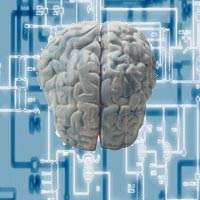But the counterpoint is that by only treating the "symptoms" of these diseased behaviors we get a plethora of inadequate law to attempt the micromanagment of individual choice yet at any point that the perpetrators of the self inflicted injury cease to harm themselves the problem dissipates.
I should hope I don't have to elaborate the inherent societal dangers of considering self-destructive behavior a disease to be treated. Hopefully I misinterpret the sense in which the phrase is used. I don't personally wish to live in Huxley's Brave New World.
francois-arouet is 100% wrong in his statement that aging is not a disease that most people die of. In one form or another the majority of people over the age of 40 die of one form or another of biological degradation that is linked to senescence. As many animal experiments have shown, when you go after the core causes of aging, you get animals with both extended lifespans and reduced time of senility at the end of their lives, i.e. they stay fit longer, and then degrade quickly. (The idea of long periods of slow degradation at the end of life is a common misconception, but it is rather silly from a biological standpoint)
I feel I need to clarify myself here. I never said that "aging is not a disease that most people die of". In fact, I don't consider aging to be a disease. But, again, that's not what I said. I said, to wit, "Diseases are what most people die of, not old age." The statement is factually verifiable, and I assure you that it is true. "Most people" does not mean "the majority of people over the age of 40", and my usage of "old age" does not mean "biological degradation that is linked to senescence". I consider "death by old age" to mean "apoptosis caused by telomeric shortening."
Arguably,
all biological degradation of someone over the age of 40 can be linked to senescence. A person who dies at 45 cannot be said to have died of old age, however, because it is common knowledge that people can routinely live to be 100. This hypothetical person died of a specific disease whose onset was certainly
accelerated by senescence, but was not a direct or necessary result of it. You miss my point entirely. Even if you ameliorate or abrogate senescence, you will still be at risk of heart disease or cancer. In fact, you will be at increased risk of cancer.
The fact that a statistically insignificant number of people ever end up living to be over 100 should be proof enough that disease research must supersede aging research. If people cannot live to their full lifespan now anyway, what's the use in increasing that lifespan?
I direct you, ocsrazor, to the
American Journal of Forensic Medicine and Pathology 2001;22:150-154. An article entitled "The Forensic Pathology of Nonagenarians and Centenarians: Do They Die of Old Age?" To answer the question the title gives, the article concludes (to paraphrase): "Usually.... no."
This
was a much longer post, but upon reflection, I've decided not to interject in most of what is being said. It would be futile, since I'd be trying to use logic and reason to attack what reads like a fanatic manifesto.
Jay the Avenger:
You need to understand that the word "disease", as used in medical science, is not the word for which you gave a definition. In medicine, "disease" is a technical term, quite apart from the common usage of the word. If the definition you give were the medical standard, then war, suicide, McDonald's food, gangs, and slipping on ice would all have to be considered medical diseases. This is what is known as a reductio ad absurdum.
If you consider aging to be a disease, you have to consider DNA to be the disease vector, and you have to consider evolution to be the process of infection. There are good evolutionary reasons why humans don't live forever, and to change that is to necessarily remove oneself from the process of evolution on this planet.
A good general definition of "disease" that satisfies both your and the medical usage of the word would be: "anything that interrupts or prevents the normal functioning of a system." By that definition, aging cannot be considered a disease, because it is part of the normal functioning of the system that is your body. If aging were a result of, say, the amount of argon in the air we breathe, then I would wholeheartedly agree with you. But, as it is, aging is a result of your genotype. It can only be stopped by interrupting or preventing the normal functioning of the system that is your body, and therefore an anti-aging treatment better qualifies as a disease than aging itself does. A person who cannot come to terms with this series of facts is welcome to define disease however they want, but they should not expect medical science to accomodate their arbitrary use of language. *Looks at ocsrazor*














































